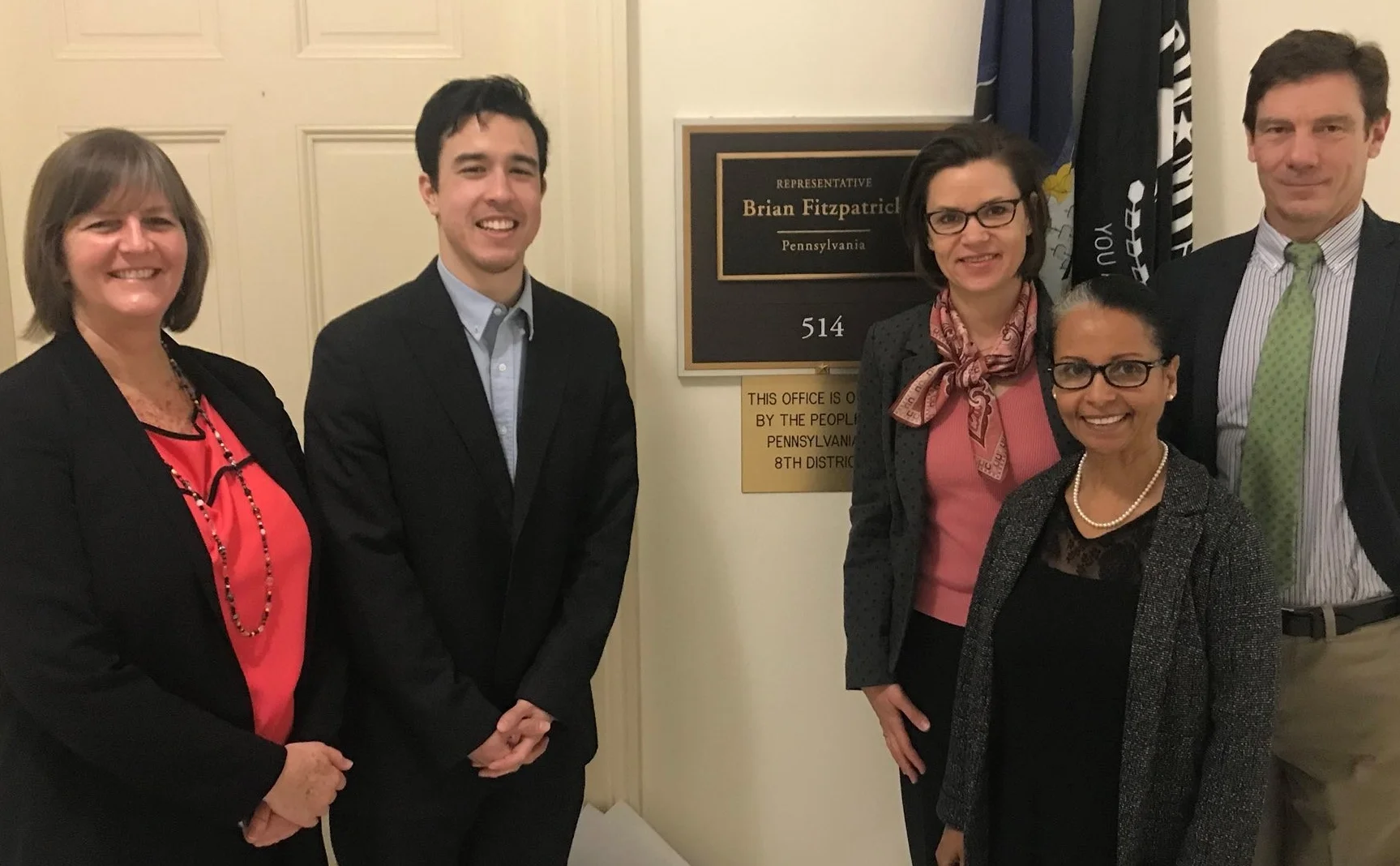The BEC Board of Directors was pleased to welcome Julie Cram, newly appointed Senior Coordinator of United States International Basic Education Assistance, on Thursday, April 19th, for an introductory meeting. Ms. Cram was accompanied by Robert Burch, Anna Roberts, Jeff Mettille, and Gina Fu, of USAID's Education Office.
BEC's CIES 2018 Program
BEC Members are preparing for a record number of presentations at CIES this year. Check them out in our BEC CIES 2018 Program. Print a copy to bring with you!
Thank you to Renata Molinari Borges da Costa for undertaking this project!
"Dear Colleagues" Letter for Basic Ed Appropriations Receives Record Support
BEC supported Rep. Reichert (R-WA) and Rep. Quigley (D-IL), Co-Chairs of the Basic Education Caucus in the U.S. House of Reps, to building support for robust funding of International Basic Education through a "Dear Colleagues" letter.
BEC, RESULTS, GCE-US, UNICEF-USA, JRS, ONE Campaign, World Learning, and Global Citizen developed and executed a joint advocacy strategy to gather Representatives' signatures on the letter, which will be presented to the Chair (Rep. Hal Rogers) and Ranking Member (Rep. Nita Lowey) of the House SFOP's Subcommittee on Appropriations.
Last year, 91 Representatives signed the Basic Education letter, including 4 Republicans and 87 Democrats. This year, in addition to the 2 bipartisan co-sponsors, 118 Representatives signed the letter (more than any recent year), including 10 Republicans and 108 Democrats. We are proud of this collaborative effort and the growing momentum for Basic Education in the U.S. House of Representatives. We look forward to continuing our advocacy efforts with new and longstanding champions of this great bipartisan cause.
BEC Members Rally for Multi-Sector ECD Advocacy Day
BEC Members teamed up with early childhood advocacy partners from the health, nutrition, and protection sectors to broaden our reach on Capitol Hill. BEC's member-advocates shared new research and personal perspective on the importance and effectiveness of early childhood education. They emphasized the need for funding and coordination, and requested inclusion of ECD report language in the House FY19 Appropriations Bill.
BEC Supports InterAction's request of no less than $51.9B for Foreign Assistance in FY19
BEC members joined InterAction's advocacy day on Capitol Hill on March 13th. The Interaction community is comprised of various organizations championing differing priorities. The lobby day unified their voices behind two shared requests to Congress: 1) Adopt a final appropriation for the remainder of FY18 that provides the highest possible funding levels for humanitarian, health, and development accounts; 2) Fully fund poverty-focused international development and humanitarian assistance accounts in FY19 at no less than $59.1 billion.
BEC Delivers Keynote Remarks at World Bank's Roundtable on Social Accountability & Education
Watch the discussion on "Accountability in Education: The Role of Citizens in Accelerating Learning for All." Stoner's remarks start at 13:30, BEC ECD Co-Chair Katherine Merseth directs the panel to issues of early childhood education at 1:15:19.
New BEC Board Member: World Learning
For 85 years, World Learning has worked to create a more peaceful and just world through education, sustainable development, and exchange programs that help people find their voices, connect with their communities, and strengthen the institutions that form the backbone of a democratic society. With this support, these emerging leaders tackle critical global issues like poverty, conflict, and inequality.
BEC M&E Group hosts USAID, talks new measures for Disability Inclusion
The BEC M&E Group, chaired by Hetal Thukral (STS Intl) and Jordene Hale (Chemonics) hosted their first meeting of 2018 on January 11th, at BEC. The group was pleased to welcome Elena Walls and Ben Sylla, of USAID. Topics of discussion included IRB requirements, results of the Assessment of the Quality of USAID Funded Evaluations, and new guidance on Collecting Data on Disability in Education Programming.
Excerpt from USAID's "How-To Note Collecting Data on Disability in Education Programming"
Collection of data on disability prevalence and type will enable USAID Missions and their implementing partners to design and implement disability-inclusive education programming that is responsive to context and can be evaluated effectively. As emphasized in this Note, USAID follows the United Nations (UN) definition of disability (footnote 1) as the outcome of the interaction between a person with a functional limitation (difficulties doing basic functional activities) and an unaccommodating environment resulting in the inability to fully participate in society. The Washington Group on Disability Statistics (WG) developed an approach for collecting data on disability to help standardize global data collection on disability. As of 2017, 69 countries used the WG’s approach. This Annex includes the WG data collection tool, describes necessary preparation steps for data collection, outlines strategies for data analysis, and lists various uses of the tool and the data. A list of resources associated with each step is provided at the end.
The WG’s approach to collecting data on disability is based on the International Classification of Functioning, Disability and Health’s (ICF) definition of six main domains of functioning (footnote 2), which include vision, hearing, mobility, memory/concentration, self-care, and communication. Respondents are asked whether they have trouble functioning in their environments, and to what extent. The WG Short Set of Questions on Disability (“WG Short Set”) includes a question per domain, as shown below.
BEC Annual Report 2017
BEC's 2017 Annual Report celebrates the extraordinary efforts and many accomplishments of Coalition members in 2017. Thank you, to all who contributed. We look forward to continuing our momentum in 2018!
BEC Publishes Event Summary: WDR18 A Conversation with the Implementers
On October 24th, 40 representatives from NGOs, the United States Agency for International Development, and the World Bank Group met to celebrate and discuss the World Development Report (WDR18): LEARNING to Realize Education’s Promise. The Basic Education Coalition (BEC) hosted the event in Washington, DC.







